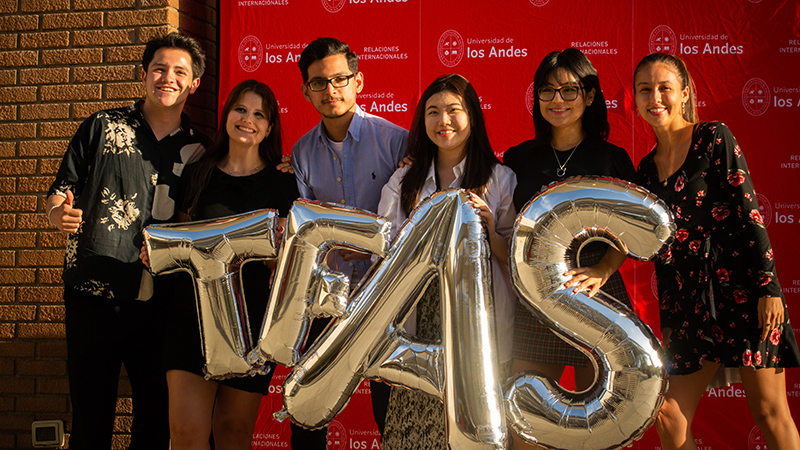
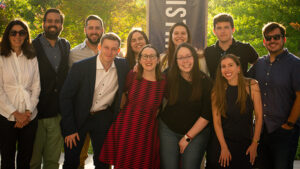
In January, The Fund for American Studies (TFAS) welcomed 51 participants from 17 countries to its two-week program in Chile, TFAS Santiago, in partnership with Universidad de los Andes (UANDES). TFAS and UANDES were thrilled to host the program again after a two-year hiatus due to COVID-19 travel restrictions. Students gathered to study the political theory of constitutional government and Latin American economic and political development while exploring sites around the city and in the neighboring port city of Valparaiso.
The program was structured around daily class sessions held on the university’s campus at the foothills of the Andes Mountains, where UANDES and TFAS faculty engaged with students through lectures, panels, and class activities. Topics included constitutional political economy, the economic and political growth of Latin America with an emphasis on Chile’s outstanding economic achievement as well as the country’s current social and political challenges.
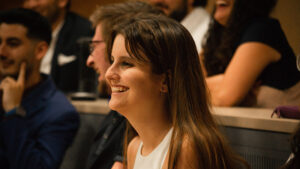
Mauricio Suárez Cal ’23 a student from Uruguay, expressed his gratitude for TFAS Santiago as it was both academically and personally stimulating.
“TFAS Santiago has been enormously enriching both academically and personally,” Cal said. “Academically, it enlightens the student with the ideas of liberty, freedom, the rule of law and limited government. Most of us were already familiar with those concepts, but TFAS provided us the opportunity to gain insight into how these concepts relate to each other under the subject of Constitutional Political Economy.”
This year’s esteemed UANDES faculty included:
- Cristóbal Benavides Almarza, dean at the School of Communication
- Soledad Bertelsen Simonetti, professor of law
- Matías Braun, professor of finance
- Juan Ignacio Brito, professor of communication
- Carlos Budnevich Le-Fort, professor of economics
- Cecilia Claro, academic vice dean
- Juan Cristóbal Nagel Beck, professor of business and economics
- Matías Petersen Cortés, SIGNOS Center director
- Cristián Rodríguez Castelblanco, professor of communications
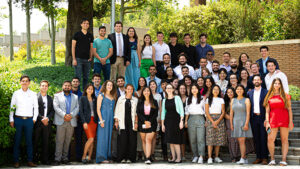
Nikolai Wenzel, professor of economics at Universidad de las Hesperides and longtime professor of TFAS International programs, including TFAS Asia, TFAS Croatia and TFAS Guatemala, joined TFAS Santiago this year to teach students about the political economy of liberty. His sessions included “Robust Political Economy: The Knowledge Problem & the Incentive Problem,” “Economic Crisis as Political Crisis” and “Philosophical Foundations: The Purpose of Government.”
During these sessions, the class discussed theories, structures, and principles governing the American system of constitutional government and the different forms of constitutional governments.
Guest lecturers included Dario Paya, executive president for the Leadership Institute’s Chilean Foundation and José Piñera, former secretary of Labor and Social Security for Chile and one of the famous “Chicago Boys” – who reformed the Chilean pension system.
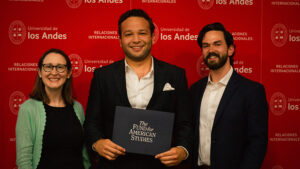
Jose David Galindo ’23 is a student from Honduras who spoke highly of the lectures that he attended and hopes to use the knowledge that he gained from this program to create change in his own country someday.
“The information provided in the lectures at the Universidad de Los Andes is very relevant and I hope to apply the knowledge acquired in my society to achieve a significant change in the course of my nation,” Galindo said.
During an interview on the Liberty + Leadership Podcast, Dr. Wenzel discussed how pleased he was with this group of students. He noted that his lectures frequently ran over the schedule because he did not want to interfere with the ongoing discussions among his students.
“There were a few times where I was not able to get through my lecture notes in an hour and a half,” Dr. Wenzel said. “That’s my fault because the conversations were just simply so good with polite disagreement amongst the students on some of the limits of constitutions and the classical liberal project.
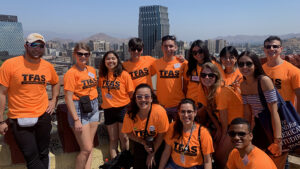
Throughout their time in Santiago, students had the opportunity to sightsee historic landmarks such as San Cristóbal Hill, Palacio de la Moneda, Cerro Santa Lucia and Santuario de la Inmaculada Concepción. One of the most memorable excursions was a day trip to the coastal city Valparaiso, known as the ‘Jewel of the Pacific.’ In addition to serving as the home to Chile’s legislative Congress and the headquarters of the Chilean navy, the city is a World Heritage Site known for its vibrant street art, multicultural music festivals, and many stairways. During their visit, students got to see the congressional building, trek around the remarkable hillside architecture, explore La Sebastiana house museum and enjoy the views of the shore from a boat tour.
The program also included a few social, professional and cultural events for students to get to know one another better and become more familiar with Chile. TFAS and UANDES held a reception to celebrate 30 years of TFAS International programs where TFAS alumni, program staff and faculty and current students connected while sharing a toast to liberty. One local alumnus, Roberto Spencer Uribe ’18, coordinated a tour of his workplace, Guerrero Olivos (GO) Law Firm, for students to meet with senior attorneys and ask questions regarding the legal profession and Chile’s current political climate.
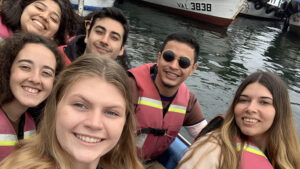
In an effort to learn from the variety of cultures within the cohort, students participated in the annual cultural presentations, a TFAS International programs favorite. This event encourages students to celebrate their own culture while learning about others through dance, music, typical dress, food and poems.
To get the full Chilean experience, students also enjoyed a traditional Chilean lunch at UANDES while learning how to play traditional Chilean games such as the ring-toss and el emboque – a game of patience and balance. Professional dancers joined the lunch to perform the Chilean national dance, the Cueca, and students eagerly joined in to try it out. Kyle Fishman, cultural attaché at the U.S. Embassy in Chile also made an appearance and shared the importance of international programs like TFAS.
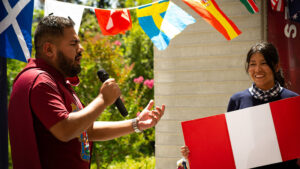
“Programs like TFAS are the lifeblood of those connections between our countries,” Fishman said. “It’s particularly gratifying to have international groups and regional groups together, because not only do you build connections with The United States, but you are able to build connections with others in your regions.”
Caroline Boyd ’21, ’23, a two-time TFAS alumna and student from George Mason University, appreciated learning about what the principles of liberty look like amongst her peers.
“In such a short amount of time I managed to have very deep discussions and debates with many of my peers and learn so much about the practice of what the principles of liberty look like in their lives,” Boyd said.
After two transformative weeks, students left TFAS Santiago with new insights about the political and economic foundations of a free society as well as lifelong memories and friendships.

